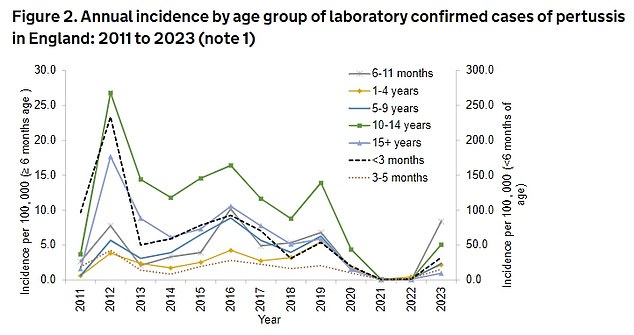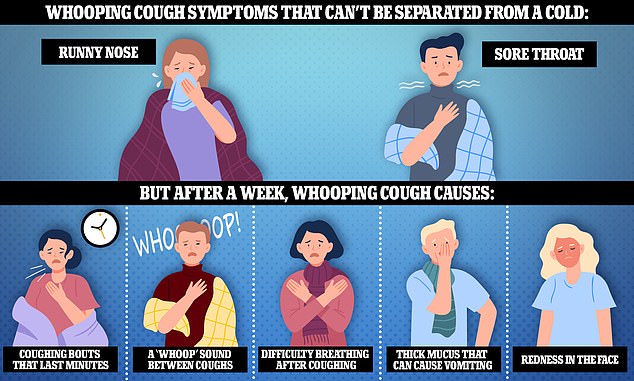Whooping cough latest: Cases SURGE by 2,600 in outbreak that has claimed the lives of nine babes... as public health chiefs renew calls for all pregnant women to get vaccinated
Whooping cough cases have surged by almost 2,600 in a single month, amid a spiralling outbreak which has terrified parents.
Health chiefs say Covid lockdowns have fuelled England's unprecedented epidemic of pertussis, nicknamed the '100-day cough' because it's notoriously hard to shake off.
More than 7,500 cases have already been recorded in 2024 — almost nine times the level seen across the entirety of 2023.
Nine babies have died since November, making it the deadliest outbreak in a decade. All were under the age of three months.
Vaccination rates have also slumped in the wake of the pandemic in a trend experts blame on growing jab scepticism.

Whooping cough cases have surged by almost 2,600 in a single month, amid a spiralling outbreak which has terrified parents. Health chiefs say Covid lockdowns have fuelled England's unprecedented epidemic of pertussis, nicknamed the '100-day cough' because it's notoriously hard to shake off

More than 7,500 cases have already been recorded in 2024 — almost nine times the level seen across the entirety of 2023. Nine babies have died since November. All were under the age of three months

Health officials warned that the infection is initially difficult to tell apart from a cold, as the first signs are a runny nose and sore throat. But around a week later, sufferers may develop coughing bouts that last minutes, struggle to breathe after coughing and make a 'whoop' sound between coughs. Other signs of whooping cough include bringing up a thick mucus that can cause vomiting and becoming red in the face
Surveillance statistics show there were 2,591 cases confirmed in England in May, up almost 500 on the 2,106 in April.
By comparison, 555 cases were logged in January, the UK Health Security Agency (UKSA) said.
Although proven to have saved millions of lives, Covid vaccines have been linked to potentially serious complications.
Mandates during the pandemic are also feared to have dented vaccine confidence.
Officials are desperately trying to ramp up vaccination rates, pleading with mothers-to-be to get jabbed.
The cancellation of many 'non essential' services during the pandemic and the consequence of lockdowns on immunity are also thought to have played a role.
Whooping cough is as contagious as measles.
It protects babies in the first few months of their life, when they are most vulnerable and before they can receive their own vaccines.
But just a quarter pregnant women have had the pertussis jab – offered between 16 and 32 weeks — in parts of London. Rates are below half in other parts of the capital and Birmingham.
Dozens of babies died each year before the pregnancy jab roll-out was introduced in England in 2012.
Dr Mary Ramsay, director of immunisation at UKHSA, said: 'Vaccination is the best defence against whooping cough and it is vital that pregnant women and young infants receive their vaccines at the right time.
'Pregnant women are offered a whooping cough vaccine in every pregnancy, ideally between 20 and 32 weeks.
'This passes protection to their baby in the womb so that they are protected from birth in the first months of their life when they are most vulnerable and before they can receive their own vaccines.
She added: 'If you have any questions or concerns about the vaccination please speak with your midwife or GP or a trusted health professional.
'With cases continuing to rise and sadly nine infant deaths since the outbreak began last November, ensuring women are vaccinated appropriately in pregnancy has never been more important.
'Our thoughts and condolences are with those families who have so tragically lost their baby.'
Kate Brintworth, chief midwifery officer for England, also said: 'The rise in whooping cough cases over the past six months, including several infant deaths, is of real concern.
'I would urge pregnant women to get vaccinated to help protect their babies in the first few weeks of their life.
'Women can access the vaccine, which also protects against diphtheria and tetanus, through their GP or some antenatal services, and parents should also ensure that their children get protected in the first few months after birth as part of the routine NHS vaccine offer.'

Surveillance statistics show there were 2,591 cases confirmed in England in May, up almost 500 on the 2,106 in April. By comparison, 555 cases were logged in January, the UK Health Security Agency (UKSA) said

Pregnant women are being urged to get the vaccine to protect their baby from catching the infection in the first few weeks of their life. Protection should last until they are old enough to get vaccinated themselves
Whooping cough can initially be difficult to tell apart from a cold, with the first signs typically being a runny nose and sore throat.
But around a week later, sufferers may develop coughing bouts which last minutes, struggle to breathe after coughing and make a 'whoop' sound between coughs.
Other signs of pertussis include bringing up a thick mucus that can cause vomiting and becoming red in the face.
Although they may not reduce symptoms, antibiotics are vital as they stop patients from being infectious within 48 hours, helping to limit the spread of the bacterial infection.
However, if a person has been infected for longer, antibiotics will not speed up their recovery.
For suspected cases of whooping cough, GPs can prescribe one of four antibiotics: clarithromycin, erythromycin, azithromycin and co-trimoxazole.
Children generally need liquid versions of the medication, with the dose based on their weight, rather than standard pills.
However, the outbreak has seen a shortage of these crucial antibiotics.
Since May, clarithromycin — one of the most widely used for whooping cough — has been in short supply in the UK.
Department of Health and Social Care (DHSC) bosses have slapped a serious shortage protocol (SSP) on the drug until at least July 19.
Whooping cough is a cyclical illness which typically peaks every five years. The last occurred in 2016, when almost 6,000 cases were confirmed.

Nearly 5,000 cases of pertussis, or the 100-day cough, have already been recorded in 2024 — more than five times the level seen across the entirety of 2023. Experts fear the true toll may be treble this. The outbreak has also claimed the lives of eight babies, making it the deadliest in a decade. But clarithromycin — used to treat various bacterial infections including whooping cough — is one of hundreds of drugs currently in short supply across the UK
Pre-pandemic, between 2,500 and 4,500 suspected cases were logged each year. This fell to around 500 during the coronavirus crisis.
Lockdowns stifled the spread of pathogens as people met less.
UKHSA bosses said the impact of the Covid pandemic also means there is reduced immunity in the population. Similar rebounds were seen for flu and RSV.
Of the 7,599 lab-confirmed cases this year, half (53.4 per cent) were among those aged 15 and older, with almost a quarter (23 per cent) in children aged 10 to 14.
But rates remained highest in babies under three months, who are most at risk.
Separate UKHSA data, however, shows the number of suspected cases detected across England and Wales in 2024, stands close to 21,000.
These are notifications of whooping cough cases to UKHSA by registered medical practitioners. They are not lab-confirmed cases
Whooping cough is caused by the pertussis bacteria and is spread by coughing and sneezing.
Sufferers are infectious from around six days after cold-like symptoms begin to three weeks after their cough starts.
Whooping cough is less severe in older children and adults but can still cause sore ribs, a hernias, ear infections and urinary incontinence among these groups.




























































































































































































































































































































































































